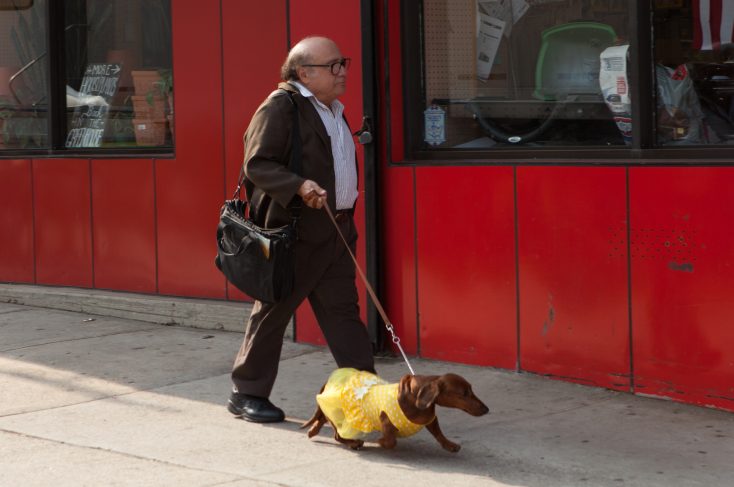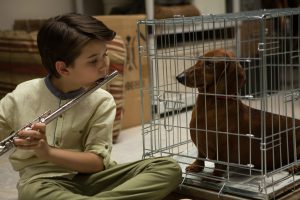By ANGELA DAWSON
Front Row Features
HOLLYWOOD—Todd Solondz’s films aren’t for everyone. A mixture of despair and humor, they often examine put-upon underdogs and seemingly normal people with deep flaws. His newest film, “Wiener-Dog,” may be one of his lighter satires—a story ostensibly about a dachshund and her journey through various ownerships—but even a cute four-legged protagonist cannot escape an inevitable fate in Solondz’s unique world view.
The New Jersey-born filmmaker is best known for creating extremely dysfunctional families in “Welcome to the Dollhouse” and “Happiness,” and the very shocking “Palindromes.” He also teaches directing and screenwriting at New York University’s prestigious Tisch School of the Arts.
“Wiener-Dog” starts out hopeful enough. Left at a shelter, the elongated shorthaired canine is adopted by a nice suburban couple whose son is recovering from cancer. Things quickly go south as dad (Tracy Letts) has a short-temper and mom (Julie Delpy) is too honest for her own good. The boy (Keaton Nigel Cooke), like Jonathan Osser’s Mikey in Solondz’s “Storytelling,” is annoyingly inquisitive. He asks his mother about suffering, death and “what about God?” to which she responds, “We don’t believe in God.” Those topics arise after Wiener-Dog (the first name the dog is given) has a dramatic bout with diarrhea.
Left for dead at the vet, the animal is taken in by Solondz’s perpetually put-upon protagonist Dawn Wiener, first played by Heather Matarazzo in “Welcome to the Dollhouse” and mentioned in passing in “Palindromes.” Dawn, whose own childhood nickname was Wiener-Dog and who renames the dachshund Doody, is portrayed with a quietly hopefulness by Greta Gerwig. Reunited with sullen acquaintance Brandon McCarthy (Kieran Culkin) from “Welcome to the Dollhouse,” she joins him on a road trip.
There’s no link between that chapter and the next, except for a brief intermission. The next person to own the dog is bitterly frustrated film professor Dave Schmerz (Danny DeVito). Having to endure duplicitous agents, clueless students and a smugly successful alumnus who mocks Schmerz’s “What if? Then what?” guidelines has turned Dave into what his doctor calls a “ticking time bomb.” Before you can say “boom” the dog is off to his next owner—the elderly and gruffly joyless Nana (Ellen Burstyn). When her seemingly solicitous granddaughter Zoe (Zosia Mamet) shows up with her self-absorbed would-be artist boyfriend, it’s soon obvious that presenting Nana with an ostrich egg isn’t the real reason for their visit. Nana has named the dog Cancer, which is in sync with her attitude toward life.
During a recent phone interview, Solondz exhibited a droll sense of humor as he explains why he revisited some of his earlier characters, the challenge of working with dachshunds and teaching at NYU.
Q: What led you to “Wiener-Dog?”
Solondz: I killed Dawn Wiener in “Palindromes.” For many years, I wanted to have the opportunity to bring her back and give her a sunnier, more hopeful life trajectory possibility than what I provided (for her) in that movie. This seemed a good way of doing that.
Q: Greta Gerwig was really marvelous in taking over that role.
Solondz: I love Greta. I loved working with her. She was a total pleasure.
Q: When did you start thinking about this and making it a four-part journey of this adorable little dachshund?
Solondz: I wrote it in order. There was a movie that came out about 50 years ago called “Au Hasard Balthazar,” and I watched it again. It gave me a kind of confidence and freedom of possibility of how to approach this because I wanted to make a dog movie. In that movie, the narrative is very oblique and even a little wildly, so I made me feel like I could approach it this way, with the dog as a kind of conceit, let’s say. It’s a McGuffin. The movie’s not really about the trials and tribulations of a dog, it’s about mortality and the way in which it shadows and hovers over the lives of each of these protagonists.
Q: What about the role of pets in people’s lives today? More and more people are living alone, with only the companionship of a pet.
Solondz: Very often a pet, a dog, can be a kind of vessel in which someone can project their own hopes, their yearnings and whathaveyou. It’s very often looked at, particularly one as cute as a dachshund as an emblem of innocence. Terrible things can happen to people but when (tragedy) happens to a dog, people find it much more difficult. In part, because they are so much a projection of what we invest in them, it’s hard to see a dog in its dog-ness with its own yearnings and its own desires, it’s own sense of meaning. It’s something of a conundrum. I think the movie responds in some sense to the way in which our emotional ties are defined with these pets.
Q: How much of a challenge is it to work with dogs, particularly dachshunds? Were they easy or difficult to direct? Did you have a number on set in case some didn’t work out?
Solondz: We had four or five of them overall. They all were remarkably stupid. That was the one comment trait they had. I learned from the ASPCA guy that a certain amount of intelligence has been bred out of them because of marketplace demands. Their mental makeup has been somewhat sacrificed to retain the kind of cuteness that is so desired. It’s similar, in ways, like the bulldog. People love the way it looks but the animal itself has certain physical ailments as a result of the needs of the marketplace.
But to get back to how difficult it was, yes, it was horrible and horribly difficult to work with the animals. Now that it’s over, I’m happy I got it in there.
Q: As a director, I suppose you like challenges.
Solondz: No, I was in denial and I didn’t think about how hard it would be. Once I was there with the dog, I was stuck. I didn’t know if I would make it to the end, it was so horrible.
Q: You have a pretty smart human cast. What was it like working with Julie Delpy, Ellen Burstyn and Danny DeVito?
Solondz: I was very fortunate, because when the actors first saw the animal, they were all immediately charmed. But at the end of the first day of working with the animal, they couldn’t wait for it to be over. I felt very fortunate to get to work with them all. I had a lovely time with them. When you cast great actors, they make you look like a better writer and director than you really are.
Q: Are you still teaching at NYU and how do people perceive you? Are there misconceptions about you?
Solondz: I don’t really think about it that much. In today’s world of the Internet, everyone’s got something to say. I can’t really think about it much; otherwise I’d go crazy. I’m still teaching at NYU. I love teaching. I love my students. I have wonderful colleagues. The school it is an Evil Empire managed with remarkable corruption and incompetence. But, for me, it’s a great pleasure to have the job.
Q: Do you have pets?
Solondz: I wish I did. My problem is it’s too much responsibility.






